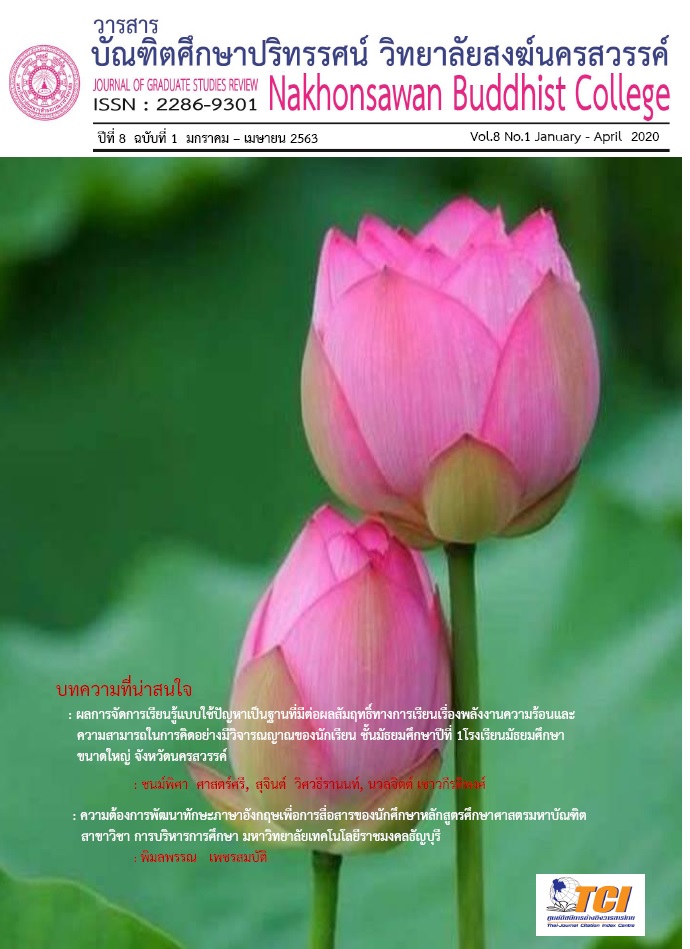การจัดการเรียนการสอนภาษาอังกฤษในประเทศไทยสำเร็จหรือล้มเหลว
Main Article Content
บทคัดย่อ
ภาษาอังกฤษเป็นหนึ่งในสามภาษาที่ใช้โดยคนในการสื่อสารรายวัน ในหลาย ๆ ทวีปทั่วโลกบางประเทศใช้เป็นภาษาราชการบางประเทศใช้เป็นภาษาท้องถิ่น ในประเทศไทยคนไทยไม่ได้ใช้ภาษาอังกฤษในการสื่อสารประจำวัน แต่เราเรียนภาษาอังกฤษที่โรงเรียนเป็นเวลา 12 ปี แม้ว่านักเรียนไทยได้เรียนภาษาอังกฤษเป็นเวลา 12 ปีแล้ว แต่พวกเขาก็ตกอยู่ในดัชนีความสามารถทางภาษาอังกฤษ: ระบบการศึกษาของไทยผิดปกติอะไร? ตามดัชนีความสามารถด้านภาษาอังกฤษของ EF ในปี 2019 จัดทำโดย Education First จากประเทศสวิสเซอร์แลนด์ประเทศไทยได้คะแนน 47.62 ซึ่งถือว่าต่ำมาก เมื่อปีที่แล้วประเทศไทยได้คะแนน 48.54 และอยู่ในอันดับที่ 64 จาก 88 ประเทศและในปี 2560 อยู่ในอันดับที่ 53 จาก 80 ประเทศด้วยคะแนน 49.7 การจัดอันดับล่าสุดทำให้ประเทศไทยเป็นประเทศที่ต่ำที่สุดเป็นอันดับสามในเอเชียตะวันออกเฉียงใต้สำหรับความสามารถด้านภาษาอังกฤษหลังเวียดนามและอินโดนีเซียซึ่งอยู่ในอันดับที่ 52 และ 61 ตามลำดับ เมียนมาร์และกัมพูชาถูกจัดอยู่ในกลุ่มที่มีความสามารถต่ำมากอันดับที่ 86 และ 94 ตามลำดับ สิงคโปร์เป็นประเทศที่มีความสามารถทางภาษาอังกฤษอยู่ในระดับสูงสุดและอยู่ในอันดับที่ 5 ของโลกในกลุ่มประเทศที่ไม่ได้ใช้ภาษาอังกฤษเป็นภาษาอังกฤษด้วยคะแนน 66.82 รองลงมาคือฟิลิปปินส์และมาเลเซียซึ่งอยู่ในกลุ่มความสามารถภาษาอังกฤษระดับสูง บทสรุปผู้บริหารของรายงานดัชนีความสามารถด้านภาษาอังกฤษของ EF ระบุว่าทั้งประเทศไทยและกัมพูชาซึ่งพึ่งพาการท่องเที่ยวในฐานะผู้มีรายได้หลักอาจได้รับผลกระทบในทางลบจากความสามารถทางภาษาอังกฤษต่ำเนื่องจากนักท่องเที่ยวเปลี่ยนไปยังจุดหมายปลายทางอื่นเนื่องจากอุปสรรคด้านภาษา ดัชนีดังกล่าวมาจากการประเมินผลการทดสอบภาษาอังกฤษโดย 2.3 ล้านคนดำเนินการโดย Education First ซึ่งเป็น บริษัท ด้านการศึกษานานาชาติที่ให้การศึกษาในต่างประเทศการเรียนรู้ภาษาการแลกเปลี่ยนทางวัฒนธรรม


